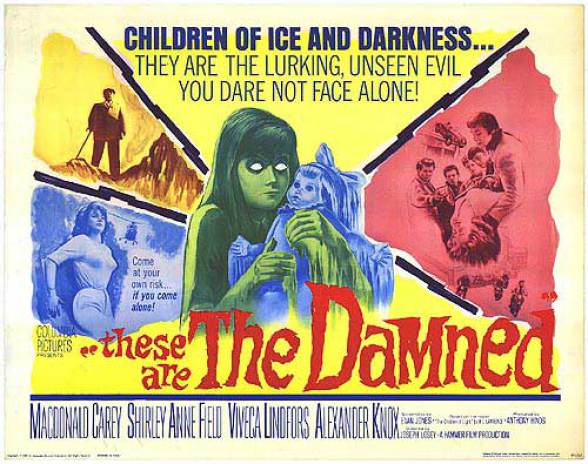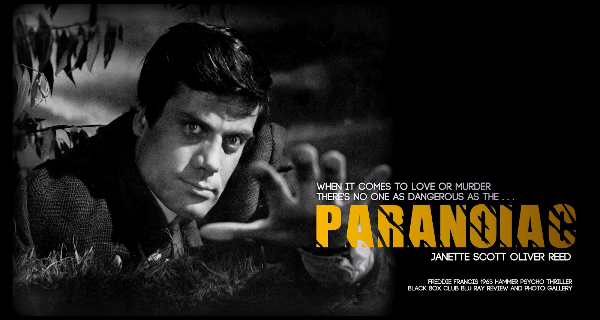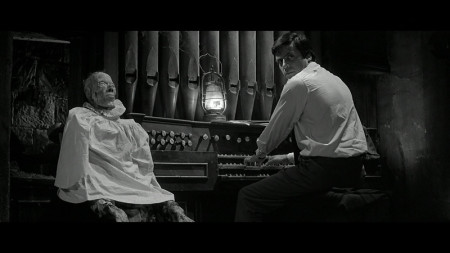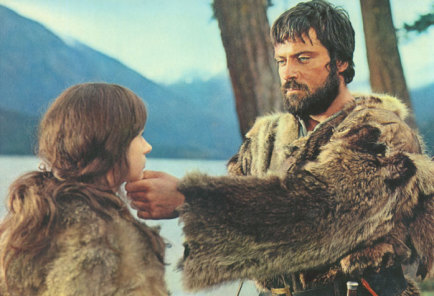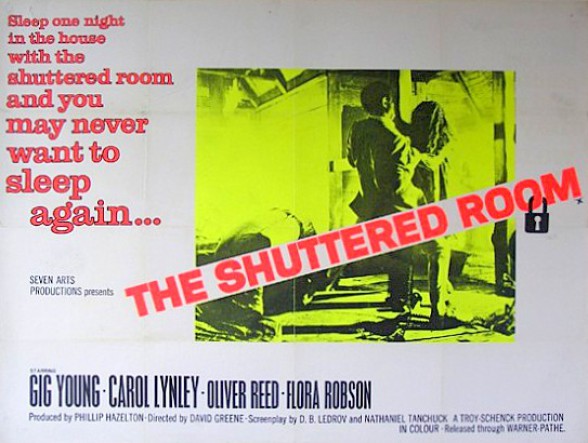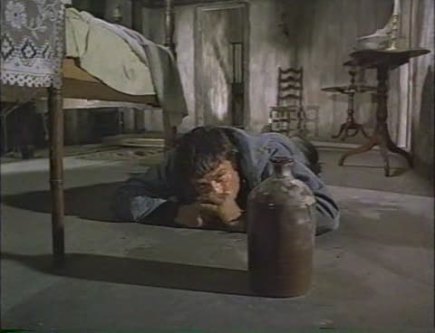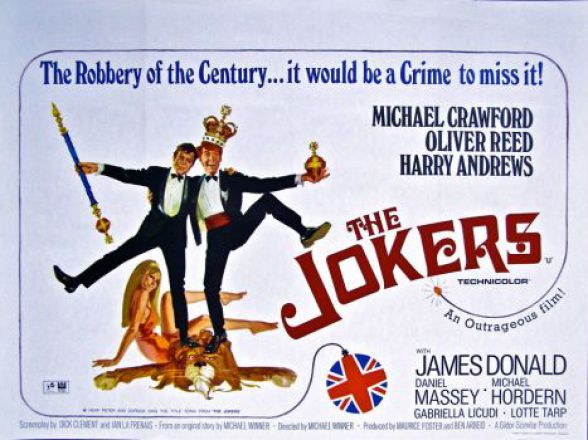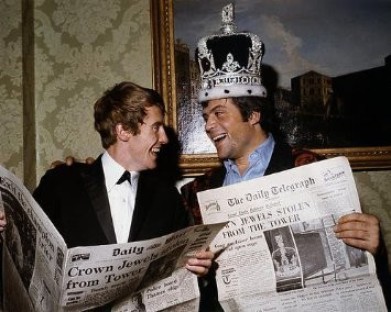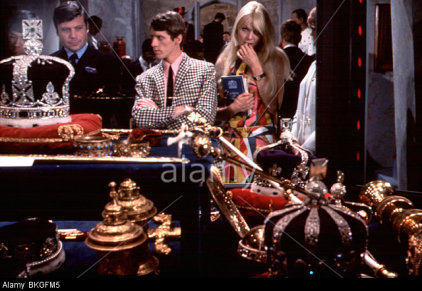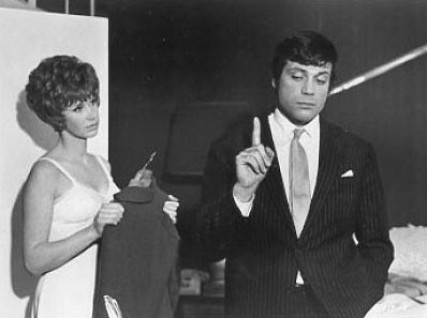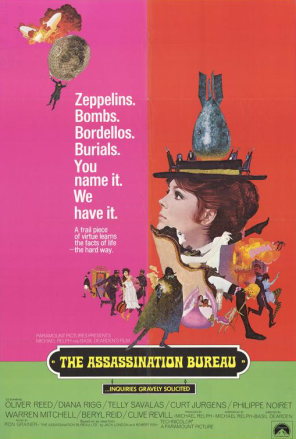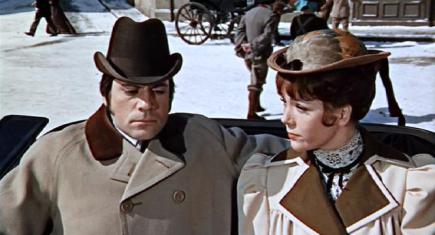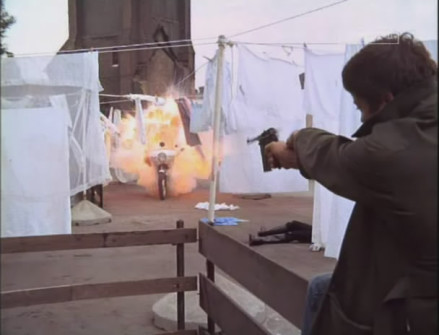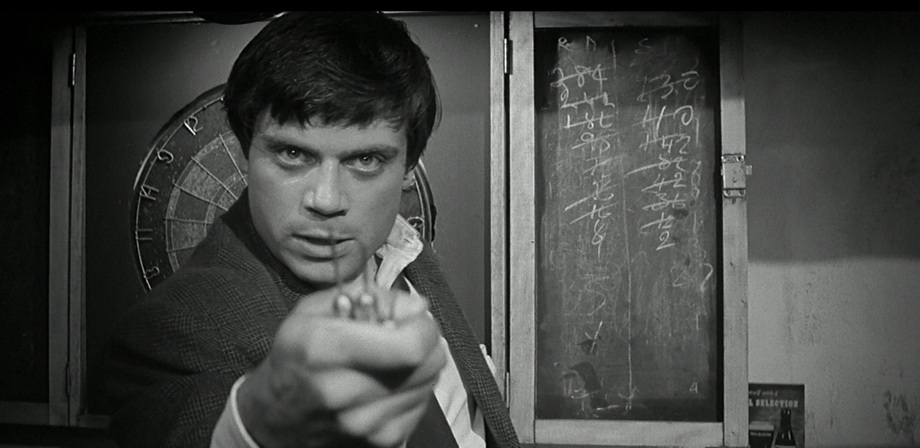
OLIVER REED IN THE SIXTIES
Reed began with some rather strange cameos in the late 50s and early 60s, as these three shots show:
The Damned (1963)
Things started to take off for Reed with an extensive support role in Joseph Losey's The Damned (1961) as the leader of a gang in Weymouth, Dorest, who find themselves getting involved in a sci-fi plot. It is noticeable, from the highly inaccurate poster for the film (right) that Reed not only does not get main billing but doesn't even get a mention; and although not relevant to Reed I can't help but mention that (a) the children are clearly victims, and are not 'evil', but also their eyes are not as depicted, in what is a blatant rip off of Children of the Damned and Village of the Damned. He plays King, the leader of a gang of bikers who start off the film by mugging unsuspecting American tourist Simon Wells (Macdonald Carey) using King's sister Joan (Shirley Anne Fields) as 'bait', as can be seen below. As was common at the time, there is an attempt to appeal to younger audiences, with the opening scene set to the bizarre and jarring backdrop of 'Black Leather Rock':
The film develops in an unexpected fashion, as Wells pursues Joan, eventually successfully, but they become caught up with a secretive defence establishment near the cliffs, where they meet up with the furtive and sinister Bernard (Alexander Knox) but are allowed to leave. Not to be put off so easily, Wells and Joan explore further and find an underground bunker linked to the base, where Bernard and other scientists have imprisoned nine children, for what purpose is unclear but one clue is that when adults enter their bunker they have to wear radioactive-protective suits. King, who has followed Wells and Joan, decides to help the children escape, but becomes affected by the radiation:
The underlying menace and violent tension prevalent in Reed's screen persona were utlised in a film made around the same time, Paranoiac.
Paranoiac (1963)
In this little-seen psychological thriller/horror, a Hammer production made at Bray Studios, Reed plays Simon Ashby, the rich and somewhat unhinged son of parents who died 11 years previously and whose brother, Antony, committed suicide 8 years ago. The problem is that Tony appears again, first seen by their sister Eleanor (a rather sreechy performance from Janette Scott) and it is therefore dismissed as her lunatic ravings. I had to show a clip, but the one I used has been blocked and my own one doesn't upload properly in the sense that I can't embed it in here as a clip. You'll just have to buy the DVD yourselves I'm afraid.
It then transpires that Tony has returned - or has he? We, the audience, soon learn that Tony is an imposter, turning up to try and collect the family inheritance that would fall to him as the eldest son, but he falls in love with Eleanor, which looks a bit odd as they're meant to be brother and sister. However, having set up an intriguing scenario, the Hammer mind set takes over, and as can be judged from the picture here, it all starts getting a bit deranged and, not to put too fine a point on it, silly - but it does allow Reed to ham it up to his heart's content.
Two of Reed's best roles at this time were in The System (his first collaboration with Michael Winner) and The Party's Over, but I have written extensively about these two in the 'Unsung films' page so won't comment further here. There was a change of scene which found Reed playing a French-Canadian trapper opposite Rita Tushingham in The Trap (1966, see right), but I have written a whole page on this film in the 'Unsung films' section so I won't comment further here. One film during this period that is worth mentioning though is The Shuttered Room.
The Shuttered Room (1967)
Reed returned to a support role for this rural horror film, very much in the 'remote locals don't like newcomers' vein so familiar now from films such as The Wicker Man and Straw Dogs. The film starts, pre-credits, with a young girl being scared by someone or something in her cot, and whoever/whatever it is is dragged by her father and locked in a room. Cut to the credits, and the young girl is now Carol Lynley (last seen by me in Bunny Lake is Missing), returning to her old house with her new husband Mike (Gig Young), but they are almost immediately terrorised by a gang of local thugs, led by Ethan (Reed).
Flora Robson as Aunt Agatha adds some gravitas to the film, and it is not without its merits, but it is more of a curio than anything, with it even being difficult to pin down as a British or an American film; although set in America, it was filmed largely in my current home county of Norfolk, and despite two American actors in the main roles the film is directed by David Greene (of The Strange Affair and I Start Counting) and appears to be technically British. These sorts of roles - not dissimilar to the ones he played in The Damned and Paranoiac - were probably not really doing Reed much good in terms of his career trajectory, so it is something of a relief to look at two enitrely different films he made around the same time, The Jokers and I'll Never Forget What's'isname.
The Jokers (1967)
Reed is teamed up with Michael Crawford as he returned to work with Michael Winner in this unlikely but attractive comedy, as they play a pair of brothers who live for practical jokes and japes aplenty. Michael Tremayne (Crawford) is drummed out of the army after messing up an exercise, but rather than knuckle down and get a proper job - they're wealthy, and this is the Swinging Sixties after all -they dream of planning and carrying out the ultimate practical joke. As they take Michael's girlfriend on a tour of London, as promised, they come up with an idea:
Having worked out that they can't be prosecuted for theft if they do not plan to 'permanently deprive' the State of the Jewels - strangely, this is about a year before the Theft Act 1968, where the definition of theft, still in force nearly 50 years later, is "to dishonestly appropriate property belonging to another with the intention of permanently depriving the other of it" - they plan to 'borrow' the crown jewels from the Tower of London, having posted letters to various solicitors etc beforehand as evidence of their intentions, and then hand then back just to prove a point. The trouble is, Michael seems to have his own ideas, as this clip demonstrates:
This is very much a Swinging London film but thankfully doesn't have all the garish lighting and flash camerawork which so spoils other films of the period; written by Dick Clement and Ian la Frenais, and also featuring Harry Andrews and Michael Hordern, The Jokers allows Reed to show a lighter side to his acting portfolio and remains an overlooked and underrated comedy of the period. It really should be released on DVD, the quality of the clips above suffers from it being a download from I've-forgotten-where.
I'll never forget what's'isname (1967)
Just as interesting, if not more so, is yet another Reed-Winner collaboration, the strangely-named I'll Never Forget what's'isname. In one sense this is another 'life in crisis' film which seemed to feature in the mid-60s (see the Albert Finney vehicle Charlie Bubbles, for example), featuring Reed as Andrew Quint, an advertising executive who suddenly decides to throw it all up and live the artistic life. The opening scene is deliberately memorable (don't think you'd be allowed to walk through the streets of London now with an axe!:
Reed is completely miscast, but still brings in a typically (at the time) sound performance,and the casting director even manages to get in Orson Welles as Quint's boss (was it only in the 60s that you could get away, or even attempt, this kind of mad miscasting?), along with Marianne Faithfull (see what I mean?), Harry Andrews and Michael Hordern again, Wendy Craig (known now as the Mum in 'Butterflies', she must have been quite trendy in the 60s to get roles in this and of course The Servant) and even my favourite Ann Lynn.
The Assassination Bureau (1968)
The late 60s now look very threadbare in terms of British film quality, apart from the odd Kes here and If...there; by and large time has moved on and left most such films looking woefully out of date. The Assassination Bureau, directed by Basil Dearden, is to some extent one such film, but it still has much to offer.
In this black comedy set in Edwardian Europe, Reed plays the head of the titular organisation, Ivan Dragomiloff (no, really!), which was founded by his father to carry out 'moral' killings of those who deserve to die. However of late it has become more of a money-making enterprise, and so when crusading journalist Miss Winter (Diana Rigg) commissions the AB to assassinate Reed himself as its head, he accepts the challenge:
Always able to outwit his former colleagues, there follows a string of mildly amusing vignettes as the Bureau's members all fail to kill Dragamiloff, although they are all unaware that the whole plot has been orchestrated by Lord Bostwick (Telly Savalas, no less) who plans to plunge Europe into war and make a finanical killing, rather than an actual one, from his arms factories. The plan is foiled of course, in a denouement not much more realistic than that provided by Chitty Chitty Bang Bang, whose mise-en-scene - see, I can use all the proper terms when I want to - it resembles. To be fair though, realism is not the aim and although I wouldn't be in a rush to watch it all over again, it's a perfectly diverting time-filler.
Sitting Target
The rot started to set in, for me, about the time of Women in Love (1969) and I don't enjoy films such as The Devils (1971) at all; but I have recently seen one other film from this period which is definitely worth looking out for, Sitting Target (1972).
This is straight out of the hard man school of British 70s crime films; it certainly deserves to be much better known, but it does suffer now from being viewed 'post-Sweeney', although it came out 2-3 years before the TV series. Reed stars with and Ian McShane as best mates and fellow convicts Harry Lomart and Birdy Williams. Lomart is inside for 15 years for killing a security guard during a robbery, and when his wife Pat (Jill St John) tells him that she is pregnant with another man's child, and is leaving him, he vows to break out, which he duly does with McShane and Freddie Francis along for the ride, and it becomes clear that Pat is the 'sitting target' of the title.
Whilst I agree that the film should be better known, I am not as convinced as Julian Upton in Offbeat, an invaluable book I have mentioned on this site before, that it is the equal, or more, of Get Carter and others. To start with, the film's structure is rather lopsided, with the prison scenes (and TV's Porridge this is not) taking 30 minutes of the 90 minutes running time, and an overlong break out scene which fails to sustain the tension. Other scenes meander and the plot becomes confusing, like an over- complicated episode of 'The Sweeney', with characters suddenly introduced and you wonder if you'd dozed off and missed something.
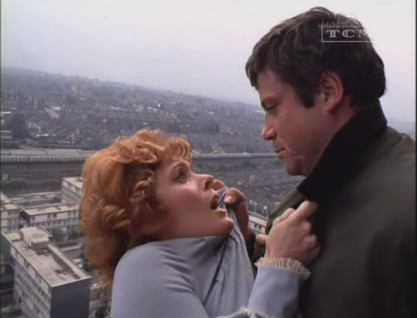 Jill St John is not enamoured of her Battersea council flat, but Reed doesn't seem to take her complaint seriously
Jill St John is not enamoured of her Battersea council flat, but Reed doesn't seem to take her complaint seriously
There is also a nasty misogynist undercurrent to the film, very prevalent at the time of course, which can be distasteful to the modern viewer (well, me), but just as I was getting fed up there was an exciting finale and a genuine twist which I hadn't seen coming, so I may go back again and re-view it. Reed tends to coast in this one, whilst McShane is excellent, but I definitely agree with Julian Upton when he writes, of Jill St John's miscasting, that she "looks as much at home in a Battersea council flat as Audrey Hepburn in a Robin Reliant" (wish I'd written that!). This clip, on youtube, is a good trailer for the film, put together for a club showing in London a year ago I think.
Despite the decline of the later 70s and 80s, it should be remembered that, despite all the drinking and tedious antics of his later years, Reed was a fine and powerful actor in the 60s.
The still at the top of the page shows Reed in Paranoiac



